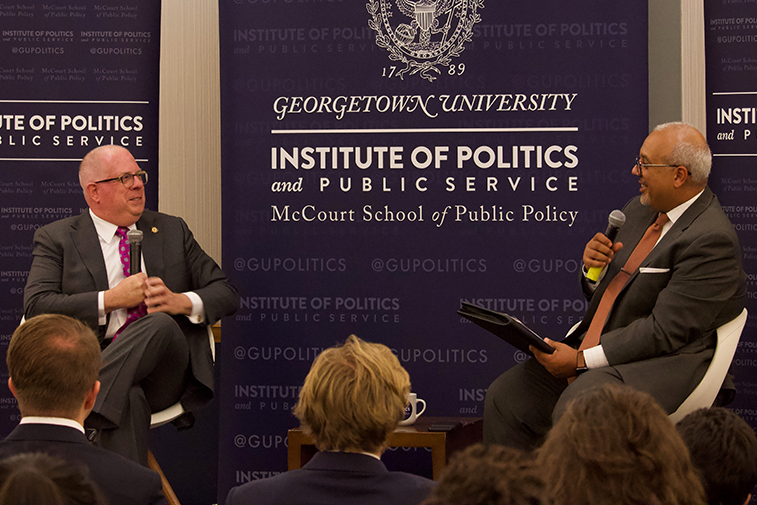Politicians must focus on bipartisanship and common sense to appeal to broad audiences, according to Governor Larry Hogan (R-Md.) at an event on Monday.
The event, “Working Across the Aisle: A Conversation with Gov. Larry Hogan,” was hosted by Georgetown University’s Institute of Politics and Public Service and Georgetown University College Republicans at the Healey Family Student Center. The dialogue was led by GU Politics Executive Director Mo Elleithee (SFS ’94).

Getting a Republican governor elected in Maryland, where 60% of constituents are registered as Democrats, was possible by focusing on problems identified by both political parties, according to Hogan.
Hogan said he strives to identify areas of cooperation for both parties. Democrats and Republicans may disagree on solutions, but identifying common issue areas can lead to bipartisan action, according to Hogan.
“We have tried to find that middle ground, where we can all stand together,” Hogan said.“We both agree that there’s a problem that needs to be fixed.”
Health care is an issue that both political parties in Washington, D.C, have failed to adequately address, Hogan said. The federal government must come to a unified consensus on health care policy to prevent nationwide fragmentation on health insurance policy, according to Hogan.
“The Republicans and Democrats, they just can’t ever have a conversation about [health care],” Hogan said. “But we actually got it done. We shouldn’t have 50 different states coming up with 50 different solutions, but we couldn’t wait.”
Working with leaders from both political parties in the state legislature made the renewal of the all-payer model of health care possible following federal approval from the Trump administration in 2018, according to Hogan.
“We got a unique all-payer model of healthcare that we got approved through the Trump administration — the only one of its kind in America,” Hogan said. “It was a real, bipartisan, common-sense solution.”
Maryland’s all-payer healthcare system was implemented in 2014, which allows the state to regulate hospital rates. The “Maryland Model” saved more than $586 million for Medicare within its first two years and is projected to save $1 billion for Medicare over the next five years, according to a press release by the Maryland Department of Health.
Hogan’s healthcare plan levied a tax against insurance companies, and the resulting revenue created a $380 million fund that was used to pay off the largest health insurance claims and stabilize the individual insurance market.
Hogan was first elected as governor in 2014 and won reelection in 2018, making him only the second Republican in the state’s history to serve a second term. Hogan currently has a 64% approval rating, according to a quarterly survey by Morning Consult.
Hogan is currently the chairman of the National Governors Association, where he has focused on issues such as improving and modernizing national infrastructure. Democratic and Republican governors across the nation work cohesively to resolve problems, helping them accomplish more than national legislators who are hindered by partisanship, according to Hogan.
“We are not on different teams,” Hogan said. “We don’t fight every week in committee. Governors on both sides of the aisle are accomplishing more than them.”
When running for his first term as governor, the Maryland economy was suffering while recovering from the Great Recession, which caused people to leave the state, according to Hogan. By focusing on practical economic issues and using his business background, his initial campaign aimed to directly solve these problems, according to Hogan.
“I come at this from a different perspective than most people,” Hogan said. “I was a small business man, who had never held elected office before. I ran a campaign saying, ‘I am going to solve problems instead of playing political games.’”





















Jean Hill • Dec 1, 2019 at 3:10 pm
My first one I read. Looking for more. Great read Steele.